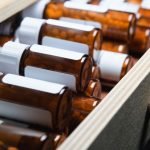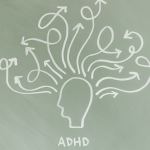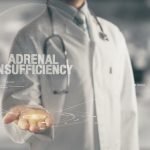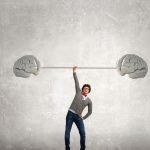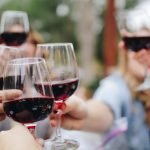New Risk and Biomarker for Early Detection of Alzheimer’s Found
Node Smith, ND
New Studies on Alzheimer’s Finds Link Between Neurodegenerative Disease and Obstructive Sleep Apnea
Two new studies on Alzheimer’s disease (AD) have found a link between the neurodegenerative disease and obstructive sleep apnea (OSA)1, as well as an early detection biomarker.2 AD is a degenerative disease marked by the accumulation of beta amyloid plaques in the brain. There have been recent connections between the degenerative disease and inflammatory states, especially the type of neurovascular inflammation commonly noted in type 2 diabetes. Some are even referring to AD as a late stage complication of diabetes, or “type 3 diabetes3.” However, the search for other associations and ways to detect the disease earlier is ever pressing.
Early Detection
Researchers at Sanford Burnham Prebys Medical Discovery Institute (SBP) have found a protein that could serve as an early detection marker in AD. The peptide, DAG, has been noted to recognize and target a protein that accumulates in brain blood vessels of AD individuals, CTGF (connective tissue growth factor). CTGF appears in AD patients before amyloid plaque development. CTGF is an inflammatory protein that is produced inside the brain and is involved in tissue repair. The elevation and correlation of this protein with AD further supports the link between inflammation and AD.
The significance of DAG is that it is able to target and identify CTGF inside the brain blood vessels. Development of this peptide as a screening tool in humans could allow earlier detection of AD, when treatment may still be possible. CTGF gives hope that there is a potential target other than beta amyloid for AD treatment. This is great news since studies targeting beta amyloid have largely been unfavorable.
AD and OSA
Another recent study has linked OSA with AD. It has found that biomarkers for AD, beta amyloid plaque, is elevated in elderly patients in proportion to OSA severity. The authors cited that OSA affects at minimum 30 percent of elderly adults, and perhaps as many as 80 percent – depending on how OSA is defined.
The study included 208 elderly individuals ages 55-90. All participants had normal cognitive function. None of the participants used a CPAP, or was diagnosed with any mental/cognitive pathology that could have affected brain function. The study found that more than half had OSA, and from that sample, a 2-year longitudinal analysis found that this OSA did correlate with increases in beta amyloid. However, the increase in beta amyloid was not correlated with any cognitive decline. This seems to support the non-linear relationship between beta amyloid plaque formation and AD progression.
Sources:
- Sharma RA, Varga AW, Bubu OM, et al. Obstructive Sleep Apnea Severity Affects Amyloid Burden in Cognitively Normal Elderly: A Longitudinal Study. Am J Respir Crit Care Med. 2017;
- Mann AP, Scodeller P, Hussain S, et al. Identification of a peptide recognizing cerebrovascular changes in mouse models of Alzheimer’s disease. Nat Commun. 2017;8(1):1403.
- De la monte SM, Wands JR. Alzheimer’s disease is type 3 diabetes-evidence reviewed. J Diabetes Sci Technol. 2008;2(6):1101-13.
Image Copyright: <a href=’https://www.123rf.com/profile_happyvector071′>happyvector071 / 123RF Stock Photo</a>
 Node Smith, ND, is a naturopathic physician in Portland, OR and associate editor for NDNR. He has been instrumental in maintaining a firm connection to the philosophy and heritage of naturopathic medicine among the next generation of docs. He helped found the first multi-generational experiential retreat, which brings elders, alumni, and students together for a weekend camp-out where naturopathic medicine and medical philosophy are experienced in nature. Four years ago he helped found the non-profit, Association for Naturopathic ReVitalization (ANR), for which he serves as the board chairman. ANR has a mission to inspire health practitioners to embody the naturopathic principles through experiential education. Node also has a firm belief that the next era of naturopathic medicine will see a resurgence of in-patient facilities which use fasting, earthing, hydrotherapy and homeopathy to bring people back from chronic diseases of modern living; he is involved in numerous conversations and projects to bring about this vision.
Node Smith, ND, is a naturopathic physician in Portland, OR and associate editor for NDNR. He has been instrumental in maintaining a firm connection to the philosophy and heritage of naturopathic medicine among the next generation of docs. He helped found the first multi-generational experiential retreat, which brings elders, alumni, and students together for a weekend camp-out where naturopathic medicine and medical philosophy are experienced in nature. Four years ago he helped found the non-profit, Association for Naturopathic ReVitalization (ANR), for which he serves as the board chairman. ANR has a mission to inspire health practitioners to embody the naturopathic principles through experiential education. Node also has a firm belief that the next era of naturopathic medicine will see a resurgence of in-patient facilities which use fasting, earthing, hydrotherapy and homeopathy to bring people back from chronic diseases of modern living; he is involved in numerous conversations and projects to bring about this vision.





